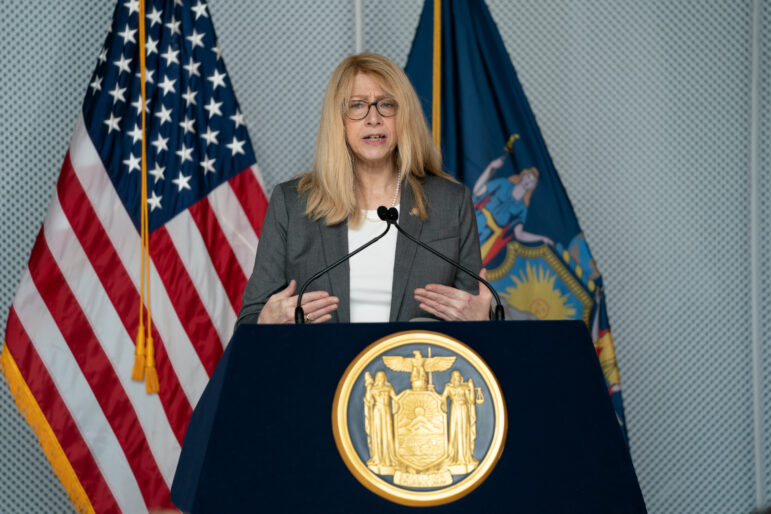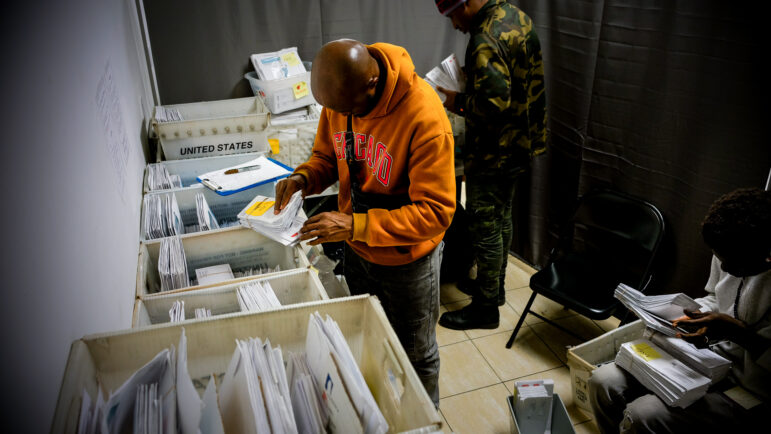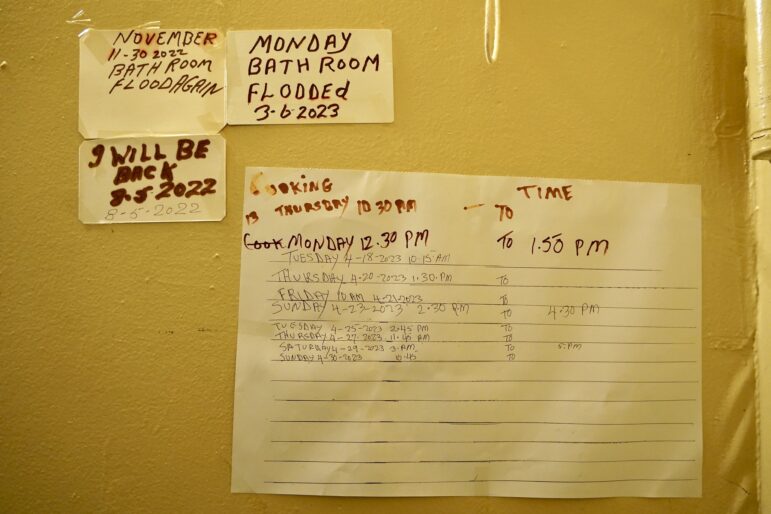While they differ in their approach, some see a convergence between the two main presidential candidates when it comes to border policy, noting with surprise that Vice President Harris has put forth some of the most restrictive proposals in decades from a Democrat.
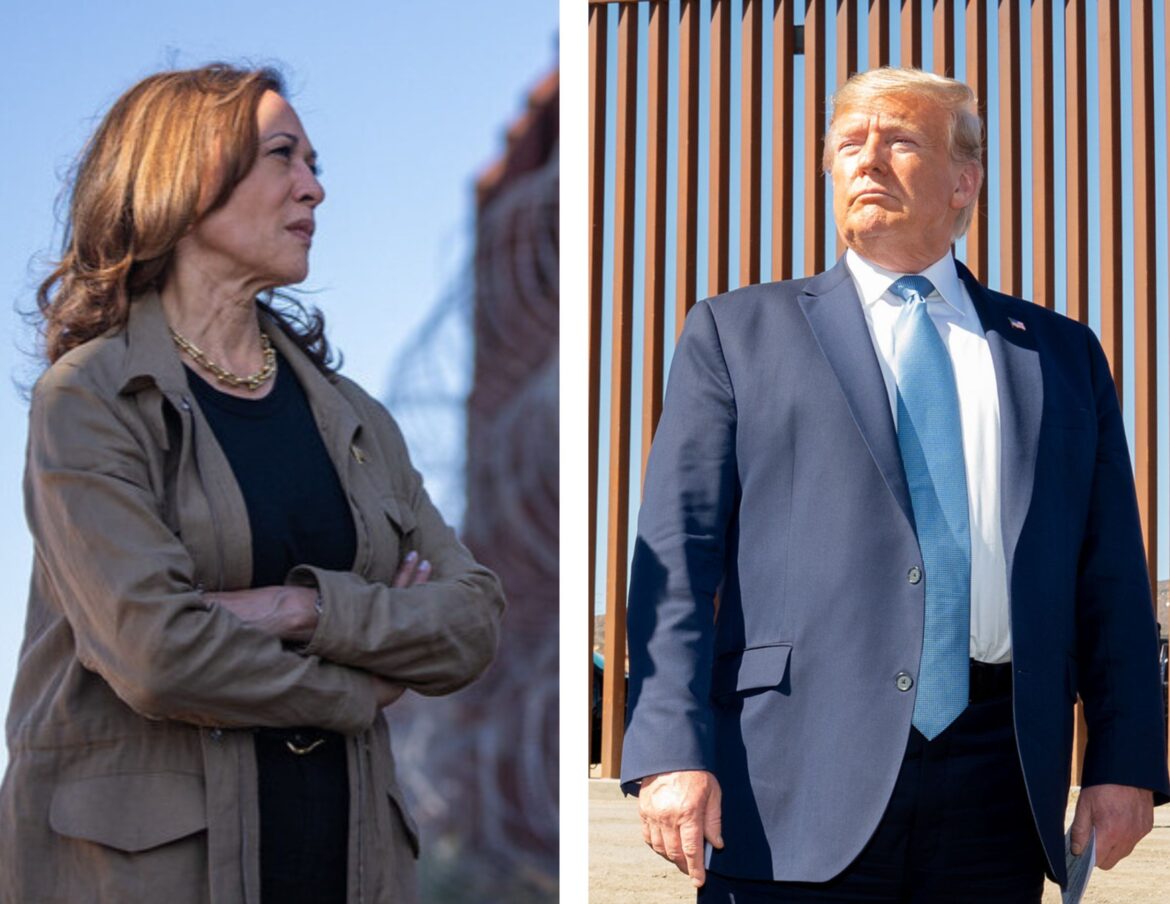
Official White House Photos by Lawrence Jackson and Shealah Craighead
Left: Vice President Harris at the U.S.-Mexico border in September. Right: Former President Trump before a section of border fence in California in 2019.With less than two weeks before the presidential election, immigration has dominated the news cycle and given people a lot to talk about—including through government agendas, racism, disinformation, misinformation, or outright lies.
The two major presidential candidates, former President Donald J. Trump and Vice President Kamala Harris, have referred to the subject almost daily. They’ve made pronouncements and occasionally detailed their plans on how they’d deal with border security, policies impacting the immigrant population currently in the country, and the new arrivals expected still to come.
Neither campaign responded to City Limits’ questions about their immigration plans, but here’s a look at some of what they’ve laid out publicly, and what advocates and experts make of their plans.
‘Xenophobia and racism’
Of the two candidates, Republican nominee Trump has the easiest agenda to summarize: his two core promises are to deport those already in the country without documentation, and “seal the border” to those who dare to come.
Moreover, Trump is taking the opposite tact to the idea that the U.S. is “a nation of immigrants,” blaming them for many of its current problems—inflation, lack of affordable housing, rising crime rates, low wages, insufficient disaster relief funds, and economic instability. He’s claimed, baselessly, that non-citizens will vote illegally in the upcoming election and that immigrants with “bad genes” are committing murders.
On Oct. 11, Trump visited Aurora, CO, and delivered a nearly 90-minute speech filled with extreme anti-immigrant rhetoric. He said that if reelected, he would implement an initiative called “Operation Aurora” to detain and deport undocumented immigrants accused of crimes under the Alien Enemies Act of 1798, invoked only three times previously, all during wars.
“We will also invoke the Alien Enemies Act to remove all known or suspected gang members, drug dealers, or cartel members from the United States, ending the scourge of Illegal Alien gang violence once and for all,” reads the 2024 GOP platform.
According to Rolling Stone, Trump and his circle would, under the law, consider Latin American cartels and gangs to be foreign nations, or actors that have co-opted and corrupted their governments to the point where they could be regarded as state actors.
“Xenophobia and racism would become the touchstones of American immigration policy, and mass deportations would tear apart families, communities, and the fabric of our nation,” Maribel Hernández Rivera, director of policy and government affairs for border and immigration at the ACLU, emphasized when discussing Trump’s plans.
Though a large part of the population supports the concept of mass deportation, according to a September poll, the logistics of such a project are questionable, and the potential costs massively expensive. The mere thought also spurs a chilling effect among immigrant communities, advocates said.
“One way to think about the impact of massive deportations and vast restrictions on immigration is the impact it would have on industry after industry: farms, restaurants, health care, child care, construction,” said David Dyssegaard Kallick, director of the Immigration Research Initiative. “But really, that’s just the tip of the iceberg.”
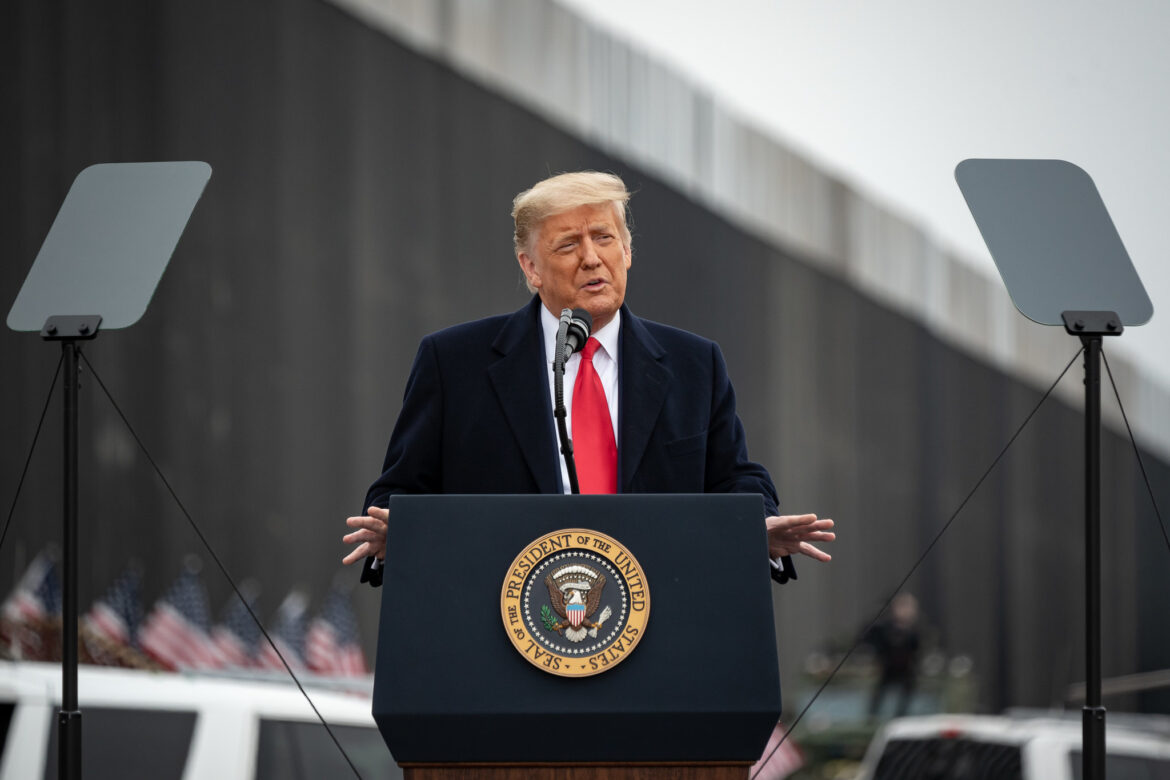
Foto oficial de la Casa Blanca por Shealah Craighead
President Donald J. Trump delivers a speech at the border wall near the Texas-Mexico border on Jan. 12, 2021.Beyond his deportation claims, Trump said he plans to reinstate many of the same policies of his first term in office: building out a border wall, the “Remain in Mexico” policy, a travel ban—but now including Gaza refugees—and asylum restrictions. Trump also wants to end birthright citizenship for children of undocumented parents.
“It cannot be understated the harms that a second Trump term would inflict on immigrants,” Hernández Rivera added.
Such policies would likely draw major local opposition: In New York City, there were dozens of protests against the former president’s immigration policies in 2017, with immigration-related public actions drawing the most participants that year, according to the organization New Yorker for Parks.
Immigrants make up about 38 percent of the city’s total population—just over 3 million people, according to the most recent city data—about 13 percent of whom are undocumented.
A border focus
While they differ in their approach, many see a convergence between the two main presidential candidates when it comes to border policy, noting with surprise that Vice President Harris has proposed some of the most restrictive proposals in decades from a Democratic candidate.
Following a visit to the border this fall, Harris vowed to maintain President Joe Biden’s asylum restrictions, which were implemented in June and have reduced the number of border crossings.
Within months of being sworn into office, President Biden tapped Harris to lead diplomatic efforts to address the root causes of migration in the Northern Triangle (El Salvador, Guatemala, and Honduras). Shortly after, during a trip to Guatemala, Harris told people there not to immigrate to the United States.
“I want to emphasize that the goal of our work is to help Guatemalans find hope at home,” she told those gathered at a press conference in 2021. “At the same time, I want to be clear to folks in this region who are thinking about making that dangerous trek to the United States-Mexico border: Do not come. Do not come.”
Some advocates say they would rather see a policy that fixes the immigration system instead.
“Poll after poll shows that voters want a balanced and humane approach to immigration,” Hernández Rivera said, including passing policies, “such as hiring more immigration judges and personnel to reduce the case backlog,”
If Harris is elected president, Hernández Rivera added, “the Harris administration must chart a new course on immigration and reject measures that slam the door shut on people whose lives are in danger, harm immigrants, and divide our communities.”
Colleen Putzel-Kavanaugh, an associate policy analyst at the Migration Policy Institute, co-authored an analysis of the candidates’ converging views in late September.
“I think that even though both parties sort of agree that the southwest border needs to be managed in a different way, or that the current tools available aren’t successful at achieving what they feel is a managed border, the how to do that is, is quite different,” she explained.
According to Harris’ website, she acknowledges that the immigration system is “broken” and needs “comprehensive reform” that includes “strong border security and an earned path to citizenship.”
However, details of how that path to citizenship would be earned are scarce.
“As I understand it…there would be some conditions you have to meet, some things you have to do if you are currently undocumented. And, if you meet them, you would first get work authorization, and then eventually you could apply for citizenship,” Kallick explained.
But, “the challenge is that this requires action from Congress,” where no immigration reform has passed in over four decades.
On Oct. 10, during a town hall hosted by Univision, a tearful voter told Harris the story of her mother, who had died a few weeks earlier and was unable to get the medical care she needed because of her immigration status.
“What are your plans?” the woman, Ivett Castillo, asked Harris. “Or do you have plans to support that subgroup of immigrants who have been here their whole lives, or most of them, and have to live and die in the shadows?”
After expressing her condolences, Harris talked about how the US Citizenship Act of 2021, a proposal the Biden administration launched after taking office that included immigration reform, imploded.
“And this is one example of the fact that there are real people who are suffering because of an inability to put solutions in front of politics,” Harris said. Immediately after, she turned to the border and politics.
“As it relates to what we need to do to strengthen our border, a bipartisan group of members of Congress, including one of the most conservative members of the United States Senate, came together with one of the strongest border security bills we’ve had in decades,” Harris said.
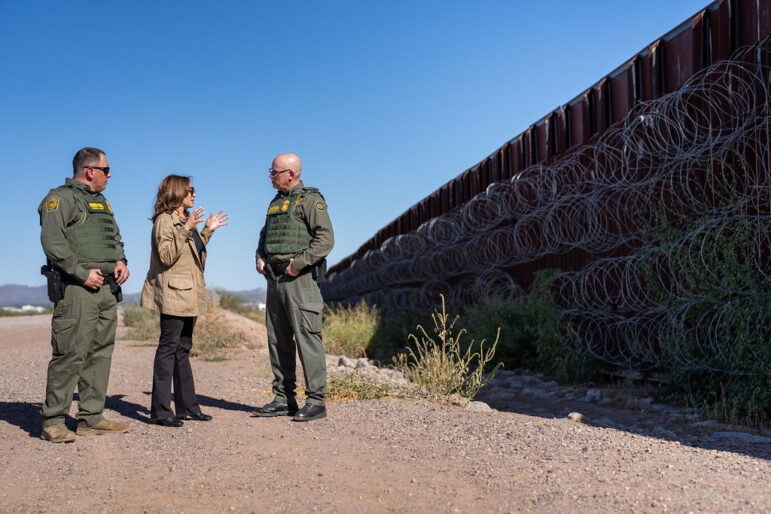
Official White House Photo by Lawrence Jackson
Vice President Kamala Harris speaks with Border Patrol officials as she visits the U.S.-Mexico border wall, on September 27, 2024, in Arizona.The vice president was referring to the bipartisan border security bill, which she supports. Though it failed to advance in Congress earlier this year, It would have provided more resources to intercept fentanyl and other drugs, added more agents on the border, and allocated money to continue building the border wall—despite Harris having called the wall a “stupid use of money” in 2017.
“As President, she will bring back the bipartisan border security bill and sign it into law,” reads Harris’ campaign website.
So far, the vice president has not offered a specific policy for Deferred Action for Childhood Arrivals (DACA) recipients, whose fate is currently being weighed by a federal appeals court.
The DACA program was created during the Obama administration to grant certain immigrants who came here as children protections against deportation, and the ability to work.It has seen obsessive scrutiny from Republicans, who through a coalition of Republican attorneys general have led a campaign to end it.
While the program remains in legal limbo, a 2021 ruling prohibited the Department of Homeland Security from processing new applications, allowing only current DACA recipients to apply for renewals and keep their protections.
“I’d like to hear Harris talking more about the crucial role immigrants play in the United States, not least in the economy,” Dyssegaard Kallick said. “Immigrants are small business owners, providing key services, and bolstering so many industries.”
To reach the reporter behind this story, contact Daniel@citylimits.org. To reach the editor, contact Jeanmarie@citylimits.org
Want to republish this story? Find City Limits’ reprint policy here.


